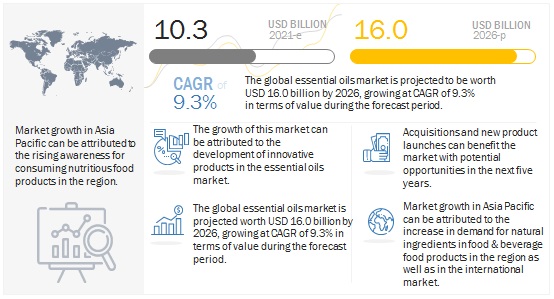The global essential oils market size is estimated to be valued USD 10.3 billion in 2021 and is expected to reach a value of USD 16.0 billion by 2026, growing at a CAGR of 9.3% in terms of value during the forecast period. In terms of volume, the market is estimated to account for 253.2 KT in 2021 and is expected to reach 345.4 KT by 2026, growing at a CAGR of 6.4% during the forecast period. Factors such as a growth in awareness toward preventive healthcare, improvements in the standard of living, and rise in double-income households, along with an increase in demand for aromatherapy are some of the factors driving to the growth of the market.

Driver: Increase in demand for aromatherapy
Aromatherapy can be defined as the use of essential oils for healing and cosmetic purposes. Essential oils benefit the physiological as well as psychological activity simultaneously in the body, owing to which they are largely used in aromatherapy. Until recently, aromatherapy was considered a complementary therapy; however, it is currently considered a mainstream therapy. The increased demand for aromatherapy could be attributed to several factors, the most important being the general rise in income in the past decade. As incomes have increased, the consumers’ tastes and preferences have also shifted toward more sophisticated products. According to the International Spa Association (ISPA), spa visits have been growing each year. According to the 2019 US Spa Industry Study, the spa industry witnessed an increase across the board in key performance metrics. The spa industry once again set records in total revenue, spa visits, spa locations, revenue per visit and total employees in 2018. Total spa revenues were USD 18.3 billion, a 4.7% increase from the USD 17.5 billion in 2017. The spa visits were up 1.6% to 190 million in 2018. The spa locations rose to 22,160, a 1.8% jump from the 21,770 in 2017 in the US. The revenue per visit climbed to USD 96.50, a 3% rise from 2017.
Download PDF Brochure: https://www.marketsandmarkets.com/pdfdownloadNew.asp?id=119674487
Challenges: Prevalence of synthetic/adulterated products
There is an important concern of adulteration in essential oils, which has become a major challenge for this market. Not all essential oils are created equal and may contain synthetic adulterants. These adulterated essential oils do not possess the properties of essential oils and merely act as fragrance products.
Adulterated essential oils are extremely hazardous. They may have numerous side effects and may cause permanent damage to the organs. However, the high prices of essential oils are the main reason for the prevalence of such adulterated and synthetic products. One liter of pure rose essential oil costs around USD 78 thousand; however, the inferior quality of the same quantity would cost around 200–300 dollars. Adulteration thus helps in cutting down the cost and making the product available for the masses, owing to which there is a prevalence of synthetic/adulterated products.
The aromatherapy segment of the essential oils market is projected to have the highest CAGR during the forecast period, by applications
By applications, the aromatherapy segment is projected to have highest CAGR during the forecast period in the global market. Essential oils are volatile liquid substances extracted from aromatic plant material by different types of extraction methods. Changing lifestyles and their consequences, such as high stress and depression, along with increasing disposable incomes, resulting in an increase in demand for aromatherapy. The oils are extracted from natural plant sources such as flowers, herbs, and trees. Different types of essential oils used in aromatherapy include tea tree oil, jasmine oil, rosemary oil, and lavender oil. These oils are used in massage therapies, acupuncture, and topical care.
Request for Customization: https://www.marketsandmarkets.com/requestCustomizationNew.asp?id=119674487
Asia Pacific is the fastest-growing market during the forecast period in the global market
The growth in population, rise in disposable incomes, rapid urbanization in the Asia Pacific region, and an increase in demand for high-quality food & beverage products are the key factors that have encouraged the demand for essential oils. Substantial growth is witnessed in countries, such as China, India, and Japan, due to the increase in the purchasing power of the population and demand for protein-rich meat diets. Moreover, consumers prefer opting for products that have high nutritional content and offer health benefits and exotic taste.
Key Market Players:
This report includes a study on the marketing and development strategies, along with a study on the product portfolios of the leading companies operating in the essential oils market. It consists of the profiles of leading companies such Cargill, Inc. (US), DuPont (US), Koninklijke DSM N.V. (Netherlands), dōTERRA International LLC (US), Givaudan SA (Switzerland), Young Living Essential Oils (US), The Lebermuth Company, Inc. (US), Symrise (Germany), Sensient Technologies Corporation (US), Essential oils of New Zealand (New Zealand), Firmenich SA (Switzerland), International Flavors & Fragrances Inc. (US), Mane (France), ROBERTET SA (France), Rocky Mountain Oils LLC (US), BIOLANDES SAS (France), Falcon (India), Farroti (Italy), Indian Essential Oils (India), and Ungerer Limited (UK).
Recent Developments:
- In February 2020, IFF completed the previously announced merger of IFF and DuPont’s Nutrition & Biosciences (“N&B”) business, pursuant to a Reverse Morris Trust transaction today. The combined company would continue to operate under the name IFF. Shares of the combined company’s common stock would trade on the New York Stock Exchange under the symbol “IFF.”
- In October 2020, dōTERRA announced several new essential oil products and diffusers, including three new wellness programs designed to help people focus on their specific health goals. The new products were announced in September at Pursue 2020.
- In February 2021, Givaudan acquired Myrissi (France). The acquisition of Myrissi would enable Givaudan’s long-term Fragrance & Beauty strategy; their expertise in AI would support Givaudan in proposing new organoleptic approaches to consumers.
















